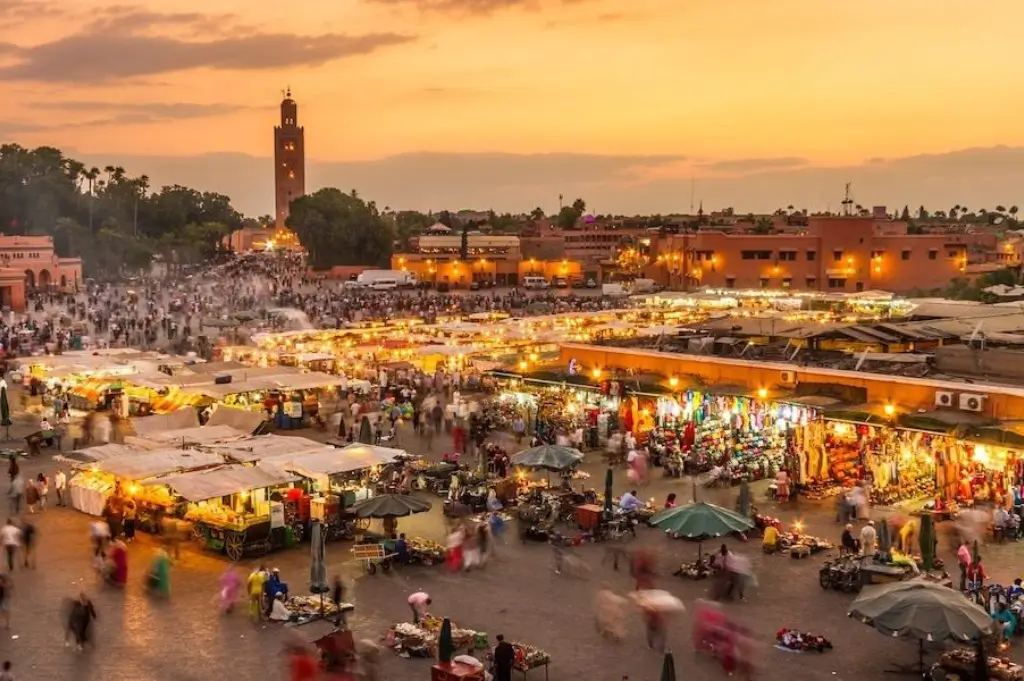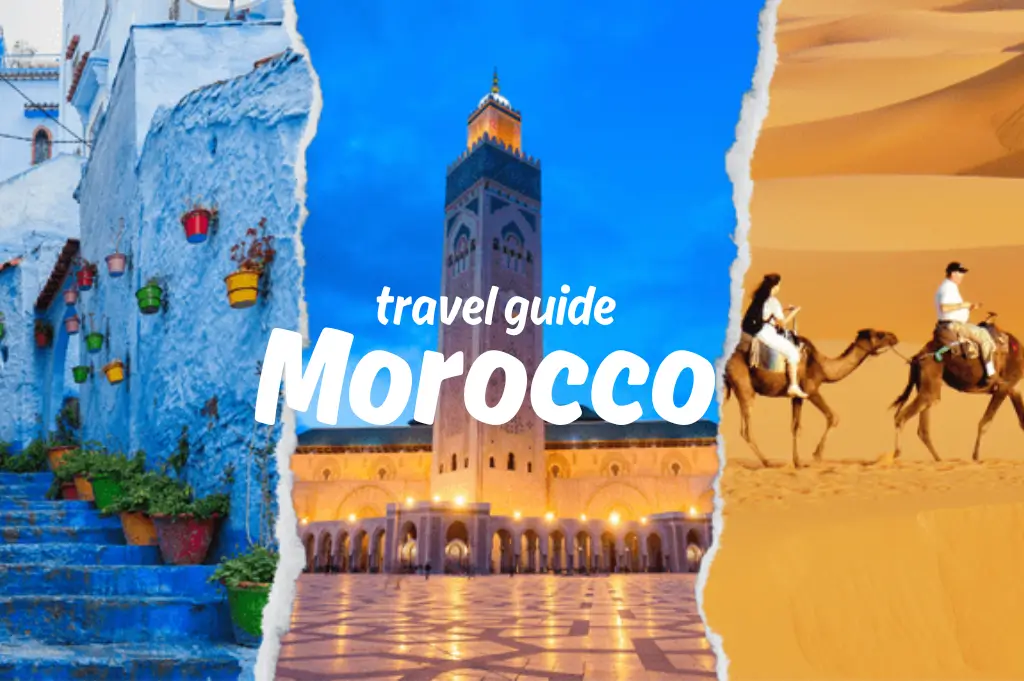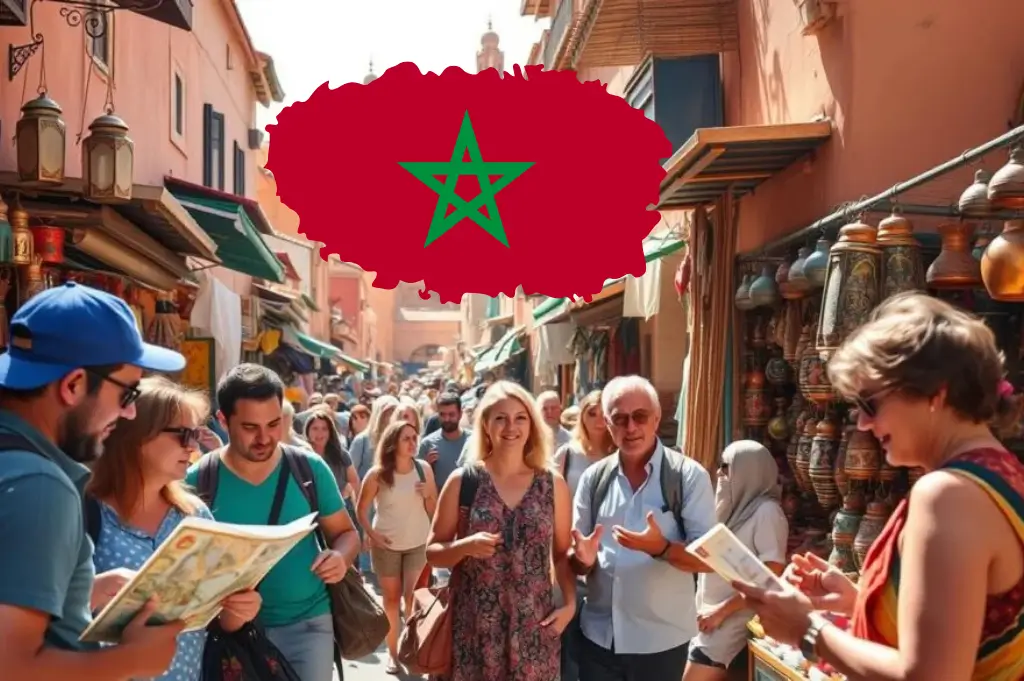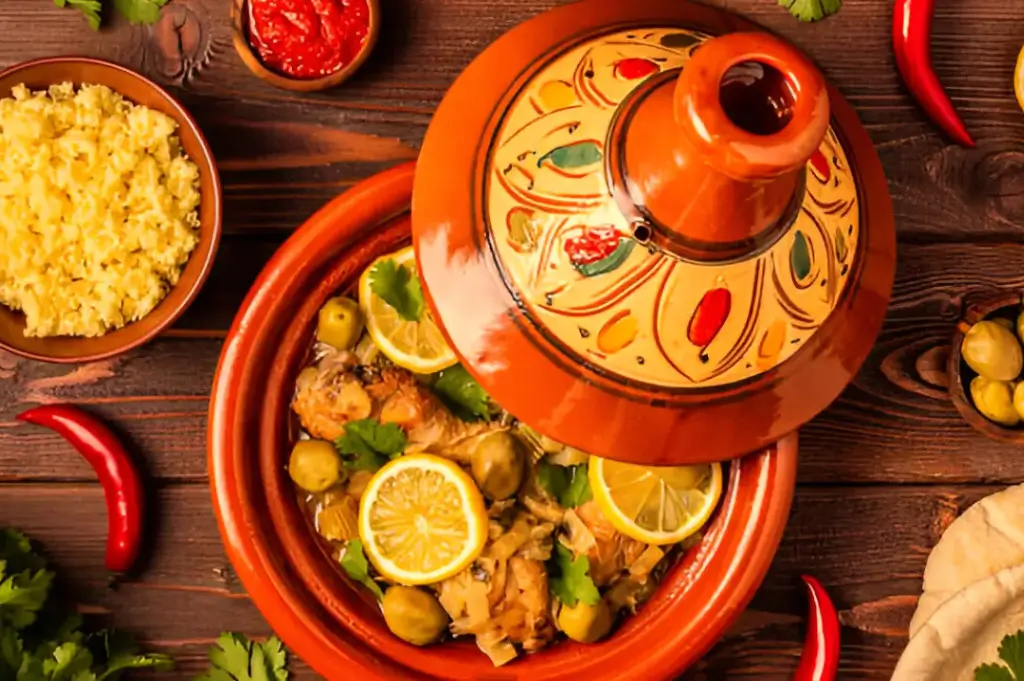The Ultimate Morocco Travel Guide: Your Gateway to an Enchanting Adventure
Morocco beckons with an irresistible blend of ancient mystique and modern allure. This comprehensive Morocco travel guide unveils a land where African authenticity meets European sophistication, creating an enchanting tapestry of experiences that captivate every traveler’s soul. From the bustling souks of Marrakech to the serene blue streets of Chefchaouen, from the golden dunes of the Sahara to the dramatic Atlas Mountains, Morocco offers a journey unlike any other.
This morocco visitors guide draws from extensive personal experiences and local insights to provide you with practical, authentic advice for navigating this remarkable destination. Whether you’re seeking adventure, cultural immersion, or simply an escape from the ordinary, this morocco guide will help you understand transport systems, discover hidden gems, appreciate cultural nuances, and ensure your safety throughout an unforgettable journey.
Let’s address the elephant in the room: Morocco isn’t always the Instagram-perfect paradise you see online. Real Morocco is messy, overwhelming, challenging, and absolutely magical in ways that no filter can capture. This morocco travel guides resource prepares you for authentic experiences while setting realistic expectations for your adventure.
Before You Go: Essential Planning & Safety
Visa & Entry Requirements
Planning your Moroccan adventure starts with understanding entry requirements. Citizens from many countries including the UK, EU nations, United States, Canada, Australia, and Singapore enjoy visa-free entry for stays up to 90 days. However, your passport must remain valid for at least six months beyond your planned departure date.
Always verify current requirements with Moroccan embassies or consulates in your country, as regulations can change. This simple step prevents unnecessary complications at border crossings and ensures smooth entry into this captivating destination.
Currency & Money Matters
The Moroccan Dirham (MAD) serves as the official currency, and understanding local financial customs enhances your travel experience significantly. While major cities accept credit cards, cash remains king throughout Morocco, especially in rural areas, traditional markets, and smaller establishments.
Exchange money upon arrival in Morocco for better rates compared to pre-departure exchanges. ATMs are readily available in cities and tourist areas, providing convenient access to local currency. However, always carry sufficient cash for day-to-day expenses, transportation, and market purchases.
Tipping culture plays an important role in Moroccan hospitality. Restaurant servers, café staff, taxi drivers, and tour guides typically receive around 10% gratuity for good service. This practice shows appreciation for local service providers while supporting the tourism economy.
Safety & Common Scams
Morocco maintains generally excellent safety standards for tourists, though vigilance remains essential, particularly for solo female travelers. Understanding common scams protects your wallet and enhances your overall experience.
Beware of “free” photo opportunities with animals like snakes or monkeys in Jemaa el-Fnaa square. These seemingly innocent encounters often result in aggressive demands for payment. Similarly, avoid unsolicited henna tattoos without prior price agreements, as costs can escalate dramatically.
Local “helpers” frequently offer directions or insist on guiding you through medinas, then demand substantial payments. Politely but firmly decline these services unless you’ve agreed to hire an official guide. Unofficial “faux guides” may lead you to shops where they receive commissions, inflating your costs.
Taxi negotiations require particular attention. Always agree on fares before entering vehicles, as meters may not function or drivers might overcharge tourists. Research typical rates for common routes and don’t hesitate to negotiate firmly.
Personal safety best practices include staying aware of your belongings in crowded areas, using money belts or secure bags, and dressing modestly to respect local culture. Cover shoulders and knees, especially when visiting religious sites, and avoid flashy jewelry that attracts unwanted attention.
Night travel alone isn’t recommended in cities, and trusting your instincts about questionable situations can prevent problems. Emergency services respond to 19 (or 112 from mobile phones), and comprehensive travel insurance provides essential protection against illness, injury, theft, or trip cancellations.
What to Wear
Morocco’s diverse climate and cultural expectations require thoughtful packing considerations. Lightweight, breathable fabrics work best for hot weather, while layers accommodate cooler evenings and mountain regions. A scarf or shawl serves dual purposes: modesty in religious settings and warmth during temperature drops.
Comfortable, closed-toe walking shoes prove essential for navigating varied terrain, especially within ancient medinas with uneven cobblestones and narrow passages. Beach areas permit modest swimwear, but conservative coverage remains appreciated throughout most of the country.
Language
Arabic and Amazigh (Berber) serve as official languages, while French and Spanish enjoy widespread usage, particularly in northern regions due to colonial history. English speakers work throughout the hospitality industry, making communication manageable for most travelers. Learning basic Arabic or French phrases demonstrates respect and often receives warm appreciation from locals.
Navigating Morocco: Getting Around
Arriving in Morocco
International flights typically arrive at Mohammed V International Airport in Casablanca or Marrakech Menara Airport. Consider open-jaw tickets, flying into one city and departing from another, to maximize your exploration without backtracking.
Ferry services from Spain (Algeceras to Tangier) offer scenic Mediterranean crossings for those preferring sea travel or continuing European road trips into Africa.
In-Country Transportation
Car rentals with private drivers provide maximum flexibility for exploring Morocco’s diverse landscapes and reaching off-the-beaten-path destinations. However, local driving styles can appear aggressive to international visitors. Professional private tours offer hassle-free alternatives with local expertise and cultural insights.
ONCF trains connect major cities including Casablanca, Marrakech, Fes, Rabat, and Tangier through reliable, comfortable networks. The high-speed Al Boraq service reduces travel times significantly between key destinations.
CTM and Supratours buses offer cost-effective intercity transportation, reaching destinations trains don’t serve, including Chefchaouen and Merzouga. Longer journeys may prove less comfortable than train alternatives.
Petits taxis accommodate up to three passengers for short city distances, while grands taxis provide shared transportation between towns. Always negotiate fares upfront, and ride-sharing apps like InDrive help benchmark reasonable rates.
Walking remains the best method for exploring cities like Marrakech and Fes, particularly their labyrinthine medinas. Prepare for sensory overload and potential harassment from unofficial guides. Offline maps prove invaluable for navigation in areas with limited internet connectivity.
Top Experiences in Morocco: A Curated Itinerary

Marrakech: The Red City’s Vibrant Pulse
Marrakech captivates visitors with its intoxicating blend of ancient traditions and modern energy. Wander through bustling souks where craftsmen practice centuries-old techniques, creating everything from leather goods to intricate metalwork. Visit iconic attractions including the ornate Bahia Palace, the towering Koutoubia Mosque, and the legendary Jemaa el-Fnaa square where snake charmers, storytellers, and food vendors create unforgettable evening spectacles.
Escape the intensity at the serene Majorelle Garden, where cobalt blue structures contrast beautifully with exotic plants. Book tickets in advance to avoid disappointment, as this popular attraction reaches capacity quickly.
Adventure enthusiasts can experience hot air balloon flights over Marrakech at sunrise, offering breathtaking aerial perspectives of the Atlas Mountains and red-clay city. Agafay Desert provides thrilling quad biking experiences just outside the city.
Nature lovers should journey to the stunning Ouzoud Waterfalls, where hiking trails lead to boat rides and swimming opportunities in natural pools. Atlas Mountain treks offer incredible scenery, with optimal conditions from April to May and September to October.
Chefchaouen: The Blue Pearl of the Rif Mountains
Chefchaouen’s blue-washed buildings create one of Morocco’s most photogenic destinations. Wander through striking medina streets where every surface seems painted in varying shades of blue, creating an almost dreamlike atmosphere.
Hike to the Spanish Mosque for panoramic views across the city and surrounding Rif Mountains, particularly beautiful during golden hour when the blue buildings glow in warm light.
Fes: Morocco’s Cultural and Spiritual Heart
Fes represents Morocco’s cultural and spiritual essence through its UNESCO World Heritage medina, a labyrinthine maze of narrow alleys, bustling souks, and historic landmarks. Enter through the ornate Bab Bou Jeloud (Blue Gate) into a world seemingly frozen in time.
Visit Al Quaraouiyine University, recognized as the world’s oldest continuously operating degree-granting university. Experience the famous Chouara Tannery by climbing to surrounding terraces for panoramic views (bring mint leaves to mask the intense odors). The stunning Al Attarine Madrasa showcases exquisite Islamic architecture and craftsmanship.
Sahara Desert: A Magical Overnight Experience
The Sahara Desert provides Morocco’s most transformative experience through camel rides across golden dunes, particularly magical during sunset when shifting light creates constantly changing landscapes.
Overnight desert camps offer unparalleled stargazing opportunities and sunrise experiences atop sand dunes. Research ethical treatment of camels and choose camps prioritizing animal welfare for responsible tourism.
Other Noteworthy Destinations & Activities
Casablanca showcases the architectural marvel of Hassan II Mosque, one of the world’s largest mosques with stunning oceanfront positioning. Book tours in advance due to limited daily slots.
Todra Gorges offers dramatic limestone cliff hiking with rock climbing opportunities for adventure enthusiasts. The Dades Valley presents stunning rock formations including the famous “Monkey Fingers,” while nearby Rose Valleys provide spectacular scenery, especially during May’s harvest season.
Essaouira provides a relaxed coastal atmosphere with excellent fish markets and fresh seafood, while Tangier offers historical exploration at the Strait of Gibraltar, including the Grand Mosque and ancient Kasbah.
Visit well-preserved Roman ruins at Volubilis, the former capital of ancient Mauretania, or explore Atlas Studios in Ouarzazate, the world’s largest film studio where numerous famous movies were filmed. Don’t miss the nearby UNESCO-listed Ksar of Aït Benhaddou.
Meknes offers a less overwhelming medina shopping experience, while cooking classes provide opportunities to learn traditional Moroccan dishes representing the country’s diverse culinary influences. Consider classes at establishments like Café Clock for authentic experiences.
Surfing enthusiasts should head to Taghazout for excellent waves, particularly during winter months. Traditional hammam experiences offer cultural immersion through physical cleansing and social interaction, available from basic public facilities to luxurious riad spas.
Moroccan Culinary Journey: A Feast for the Senses
Must-Try Traditional Dishes
Tagine represents Morocco’s signature slow-cooked stew, available with lamb, chicken, or vegetables, each variation offering unique flavor profiles developed through generations of culinary tradition.
Couscous, steamed semolina typically served communally on Fridays, forms the foundation of many Moroccan meals. Pastilla (Bastilla) presents a unique savory-sweet flaky pastry combining spiced meat with almonds, creating unexpected but delicious flavor combinations.
Harira, a hearty and nourishing soup often consumed during Ramadan, provides comfort food that satisfies both locals and visitors seeking authentic flavors.
Beverages & Sweets
Mint tea, affectionately known as “Moroccan Whisky,” serves as a refreshing, sweet beverage symbolizing hospitality throughout the country. The ceremonial pouring ritual adds cultural significance to this everyday pleasure.
Moroccan bread (Khobz) appears at every meal as a round, crusty staple perfect for scooping up various dishes. Traditional sweets featuring honey, almonds, and sesame create treats like chebakia and msemen that satisfy any sweet tooth.
Dining Tips
Street food provides cheap, authentic meals that offer genuine local flavors and experiences. For more refined dining, restaurants like Nomad or Le Jardin in Marrakech serve modern interpretations of traditional Moroccan cuisine in stylish settings.
Shopping in Morocco: Souvenirs & Local Crafts
Must-Buy Products
Argan oil, prized for skincare and haircare benefits, represents one of Morocco’s most sought-after products. Prickly pear oil offers anti-aging properties but commands higher prices due to complex extraction processes.
Handcrafted textiles and rugs feature intricate patterns and vibrant colors created through traditional techniques passed down through generations. High-quality leather products including bags, shoes, and jackets showcase craftsmanship often visible in the tanneries where they’re created.
Metal and stained glass lamps cast beautiful patterns while intricate handmade tiles add Moroccan flair to any space. Traditional Berber jackets provide warmth and style, particularly abundant in mountainous regions like Chefchaouen.
Shopping Tips
Haggling forms an integral part of Moroccan shopping culture. Start negotiations at 10-25% of initial asking prices and remain prepared to walk away if agreements can’t be reached. This practice is expected and respected rather than considered rude. Beware of shop owners demanding payment for photography, and always agree on photo policies before entering stores.
Moroccan Culture: Beyond the Tourist Trail
The Riad Experience
Riads, traditional Moroccan houses or palaces featuring interior gardens, offer tranquil sanctuaries providing deep connections to Morocco’s rich architectural heritage and renowned hospitality. Staying in at least one riad during your visit provides authentic cultural immersion impossible to experience in conventional hotels.
Hammam Ritual
Traditional hammam experiences combine physical cleansing with social interaction through steam, scrubbing, and nourishing oils. This unique bathing ritual offers cultural insight while providing relaxation and rejuvenation.
Hospitality
Moroccans generally demonstrate welcoming, friendly natures, showing remarkable patience in helping visitors understand and appreciate their rich culture. This genuine hospitality creates lasting memories and meaningful connections.
Cultural Nuances
Navigate public interactions respectfully by managing sensory overload in bustling areas while respecting local norms including modest dress and limited public displays of affection. Nightlife and alcohol availability remain limited due to Islamic cultural influences, but this creates opportunities to experience authentic Moroccan evening entertainment and socializing.
Best Time to Visit Morocco: A Seasonal Guide
Spring (March to May) provides ideal conditions with mild temperatures, blooming landscapes perfect for outdoor activities, and cultural festivals like the Fes Festival of World Sacred Music. Smaller crowds enhance the experience while maintaining pleasant weather.
Summer (June to August) brings very hot conditions inland in cities like Marrakech and Fes, while coastal areas including Tangier, Rabat, and Essaouira remain cooler, making them ideal for beach visits and maritime activities.
Autumn (September to November) offers pleasant weather with various cultural events, creating excellent conditions for most activities while avoiding extreme temperatures.
Winter (December to February) provides mild conditions with potentially cold evenings, suitable for Atlas Mountains skiing and experiencing festive traditions. Northern and coastal areas may experience wet weather during this period.
Tracking Performance & Continuous Improvement
Successful travel experiences, like effective morocco trip guide resources, benefit from continuous evaluation and refinement. Monitor your journey’s highlights, challenges, and discoveries to enhance future adventures and share insights with fellow travelers.
Modern travelers increasingly rely on authentic, experience-based vacation in morocco guide information rather than generic promotional content. Personal experiences, detailed insights, and honest assessments provide the most value for future visitors planning their own Moroccan adventures.
Conclusion: Your Morocco Travel Guide Adventure Awaits
Morocco stands as a stunning destination deserving thorough exploration, offering transformative experiences that blend ancient traditions with contemporary adventures. This comprehensive morocco holiday guide provides the foundation for planning an unforgettable journey, whether you seek cultural immersion, outdoor adventures, culinary discoveries, or simply escape from everyday routines.
The best travel guide morocco resources combine technical precision with authentic storytelling, ensuring you’re prepared practically while remaining open to the magic and spontaneity that make Morocco so captivating. From the best morocco travel guide perspectives, success comes from balancing careful planning with flexibility to embrace unexpected opportunities.
Your Moroccan adventure awaits, promising memories that will last a lifetime. Use this morocco travel resource as your foundation, but remember that the most meaningful experiences often happen when you venture beyond guidebooks and connect authentically with this remarkable land and its welcoming people.
For those wondering how to go to morocco and make the most of their journey, remember that the right preparation combined with an open heart and curious mind leads to sustained success and truly unforgettable memories. Your Moroccan story begins now.







